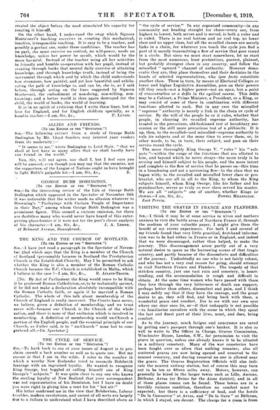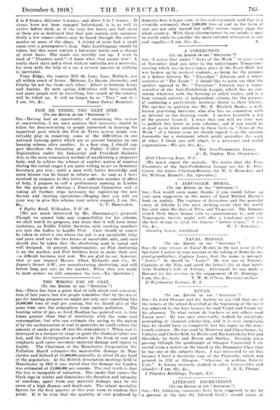VISITING THE GRAVES IN FRANCE AND FLANDERS. [To THE EDITOR
OF THE " SPECTATOR.'
SIR, —I think it may be of some service to wives and mothers anxious to visit the battle areas of Northern France if, through the medium of your valuable paper, I might give them the benefit of my recent experiences. For both I and several of my friends found that very little practiCal, first-hand informa- tion was to be had either in France or in England, and indeed that we were discouraged, rather than helped, to make the journey. This discouragement arose partly out of a very natural desire to spare us the harrowing scenes of that tragic country, and partly because of the discomforts and difficulties of the journey. Undoubtedly no one who is not fairly robust, and who has not a very real reason for going, should attempt to visit Northern France and Flanders. The tragedy of that stricken country, just one vast ruin and cemetery, is heart- rending, and the accommodation is rough and difficult to obtain. At the same time women who have passed with those they love through the very bitterness of death can support, perhaps better than others, discomfort and pain, and I think I may safely say that if they have the courage, and the great desire to go, they will find, and bring back with them, a wonderful peace and comfort. For to see with our own eyes where our dear ones lie, or—if that unhappily is not possible —to familiarize ourselves with the scene in which they spent the last and finest part of their lives, must, and does, bring comfort.
As to the journey, much fatigue and annoyance are saved by getting one's passport through one's banker. It is also as well to write to The Officer in Charge. Graves Commission, Winchester House, London, S.W., for permission to visit the grave in question, unless one already knows it to be situated in a military cemetery. Many of the war cemeteries have been fought over so often that nothing remains; also all scattered graves are now being opened and removed to the nearest cemetery, and during removal. no one is allowed near the grave. The Graves Registration Officials will also indi- cate the nearest railway station, but of course this may turn out to be ten or fifteen miles away. Motors, however, can generally be hired in the larger towns such as Lille, Amiens, Bethune, Arras (or Reims for the Aisne district), and in all of these places rooms can be found. These towns are in a terribly ruinous condition, therefore no comfort must be expected; but there is a sufficiency of food, and the hotels
De la Commerce" at Arras, and " De la Gare " at Bethune, in which I stayed, are decent. The charge for a room is from
5 to 9 francs, dejeuner 5 francs, and diner 5 to 7 francs. If rooms have not been engaged beforehand, it is as well to arrive before dark, as if the very few hotels are full—most of them are so destroyed that they now contain only compara- tively a few rooms—others may be found through the station- master or some of the shops. A friend of mine had a small room over a greengrocer's shop. Only hand-luggage should be taken, but this must contain a hot-water bottle and a change of stout boots. The roads are terribly cut up. I used to read of "Flanders mud "—I know what that means now! A really short skirt and a stout stick or umbrella are a necessity, for even with the help of a car a certain amount of walking is inevitable.
Vimy Ridge, the famous Hill 60, Lens, Loos, Hulluch, are all within reach of Arras. Bethune, La Besse°, Givenchy, and Ginehy lie not far from each other. Albert is between Arras and Amiens. By next spring difficulties will have lessened, and more people will be travelling, but—much of the country willsbe tidied up. It will no longer be as " They" saw it.—















































 Previous page
Previous page